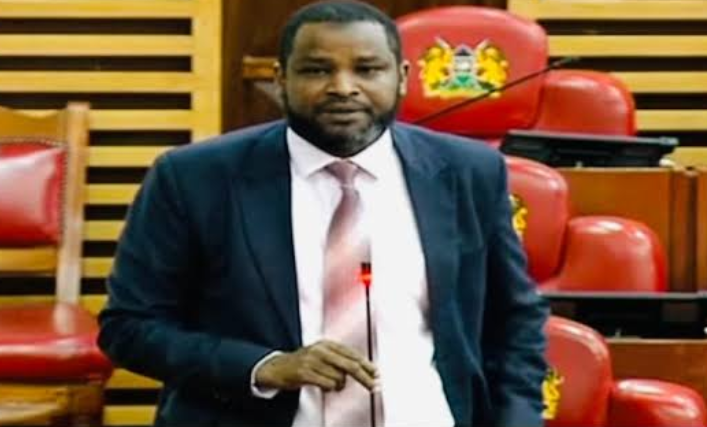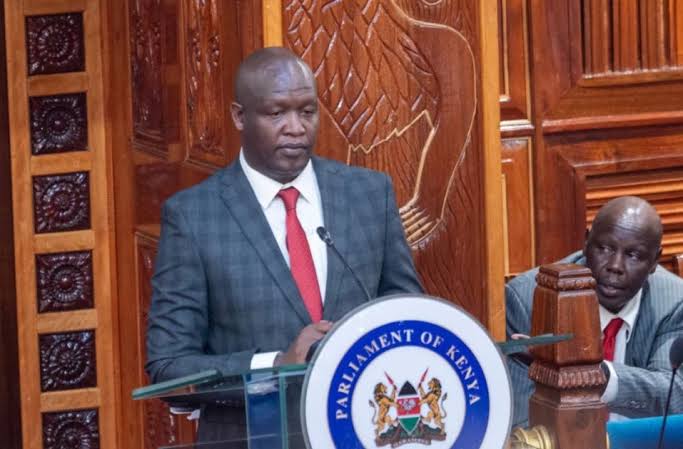The National Police Service (NPS) has strongly opposed a proposal seeking to introduce a retirement age and term limit for the Inspector General of Police (IG) and Deputy Inspector Generals (DIGs).
The proposed National Police Service (Amendment) Bill 2025, sponsored by Teso North MP Oku Kaunya, aims to cap the IG’s and deputies’ retirement age at 60 years. It also introduces a five-year term limit for the DIGs, a move that could see Inspector General Douglas Kanja, who is 61, exit office prematurely.
Appearing before the National Assembly Committee on Administration and Internal Security, the NPS, represented by its Director of Legal Affairs, Amos Obuga, warned that the proposed changes would harm leadership stability within the service.

NPS Opposes Police IG Retirement Age Bill and Defends Experience Over Age
The NPS argued that age should not be used as a disqualifying factor in determining leadership positions within the service.
Obuga maintained that competence, professionalism, and institutional knowledge should remain the guiding principles in appointing and retaining senior officers.
“While age correlates with experience, it should not be used as a disqualifying factor for leadership. Competence, integrity, professionalism and strategic thinking should remain the principal criteria for appointment to the positions of IG and the two deputies,” he said.
If adopted, the proposed law could push out seasoned officers, including IG Kanja, who has led the service since 2023. Obuga warned that the changes could result in the premature loss of experienced leaders capable of managing national security challenges.
He further noted that the NPS requires leaders who have accumulated deep institutional memory and operational knowledge, qualities that cannot be replaced merely by setting age limits.
Tes Lawmaker Defends the Bill
Teso North MP Oku Kaunya, who sponsored the bill, defended it, saying the amendment is designed to promote accountability and efficient succession planning within the police service.
According to Kaunya, setting a clear retirement age and introducing term limits will help inject new energy into the top ranks and prevent overconcentration of power in one office.
He argued that the changes would align Kenya’s police leadership structure with regional standards. “The amendment seeks to ensure that those appointed to the offices have the capacity to handle the demanding nature of leadership within the police service,” Kaunya said.
Kaunya added that the bill supports orderly transition by ensuring the service retains qualified officers while creating room for new leadership to emerge.
If approved, the law would also introduce new procedures for the recruitment and removal of both the IG and DIGs, aligning with the broader police reform agenda initiated by the Maraga Taskforce.
IPOA and Maraga Taskforce Back the Proposal
The Independent Policing Oversight Authority (IPOA) chairperson, Ahmed Issack Hassan, threw his weight behind the bill, praising its provisions on the appointment and removal processes for senior police officers.
Hassan said the bill aligns with the recommendations of the “National Task Force on Improvement of Terms and Conditions of Service and Other Reforms for Members of the National Police Service and Kenya Prisons Service,” also known as the Maraga Taskforce.
He emphasized that the appointment of the IG and DIGs should adhere to the two-thirds gender rule under Article 27 of the Constitution. Hassan also noted that regional examples show that Kenya’s police leadership structure lacks uniformity compared to neighboring nations.
“In Tanzania, the age of retirement for an officer in the rank of Assistant Superintendent of Police up to the Inspector General is 60 years, while in Uganda, all police officers are required to retire at 55 or after 20 years of continuous service,” Hassan said.
He argued that aligning Kenya’s police retirement framework with those of other East African countries would promote consistency and professionalism across the region.
Balancing Reform and Experience
The ongoing debate has divided stakeholders, with the NPS warning against losing experienced leadership and reform advocates calling for modernized governance structures.
Supporters of the bill see it as a way to create accountability and merit-based progression in the force. Opponents, however, believe the proposed limits could destabilize leadership and hinder continuity in national security operations.
While the National Assembly Committee reviews the bill, both sides agree that reforming police leadership must balance institutional stability with transparent and merit-based succession.
Whether the bill passes or not, the discussion reflects growing tension between maintaining experienced command and embracing new leadership within Kenya’s law enforcement.
Proposed vs. Current Provisions
| Provision | Current Law | Proposed Amendment |
|---|---|---|
| Retirement Age for IG and Deputies | Not specified | Capped at 60 years |
| Term Limit for IG | 4 years, non-renewable | Unchanged |
| Term Limit for DIGs | None | 5 years |
| Appointment & Removal Procedures | Existing under NPS Act | Revised for transparency |
| Gender Rule | Not explicitly applied | Two-thirds rule to apply |









































